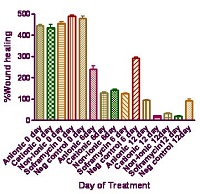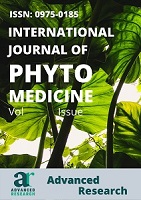ound Healing Evaluation of Some Herbal Formulations Containing Curcuma Longa and Cynodon Dactylon Extract
Keywords:
Curcuma longa, Cynodon dactylon, Dead space wound, Incision, ExcisionAbstract
The wound healing effect of herbal cream formulated with Curcuma longa, and Cynodon dactylon embedded in different ointment bases (anionic, cationic and non-ionic) has been evaluated in vivo using the incision, excision and dead space tissue wound models, on Swiss wister rat. Curcuma longa, and Cynodon dactylon was extracted using Pet ether (60-800C ), chloroform, ethanol, methanol and water. The methanolic extract formulated as herbal preparations. The herbal preparations were used to treat wounds inflicted on experimental Swiss wister rat. The wound healing effects of the formulations were compared to that of a standard antibiotic. In all cases, there was a progressive decrease in wound area with time, indicating an efficacy of the formulations in healing the induced wounds. By the 16th day, the formulation containing 100 mg/g of Curcuma longa, and Cynodon dactylon in cationic base showed 100 % healing. The wound areas in the animals treated with the standard antibiotic, showed a 100% healing by the 17 th day, indicating that the plant extract, at that given concentration, had a better wound healing property.
References
. Taber, CW. Taber’s Cyclopedic Medical
Dictionary, 10th edition, F. A. Davies
Company, U. S. A. 1965.
. Thomas, J C.,Veterinary Pathology, 6th
edition, William’s and Wilkin, Maryland,
USA, 1997, pp. 150-156.
. Karl M., Lacrix J.V, Preston H.H. Canine
surgery, 4th edition, American Veterinary
Publications, California., 1995, pp 42-45.
. Ahmed, S., Reza, M.S., Haider, S.S.,
Jabbar, A., Antimicrobial activity of
Cynodon dactylon. Fitoterapia., 1994,65,
–464.
. Balachandran P., Govindarajan R.,
Ayurvedic drug discovery, Expert
Opinion Drug Dis., 2007, 2 (12),1631-
. Jarald, E.E., Joshi S.B., Jain D.C.,
Antidiabetic activity of aqueous
extract and non polysaccharide
fraction of Cynodon dactylon Pers.
Ind J Exp Bio., 2008,46: 660-667.
. Santhi R., Kalaiselvi K., Annapoorani S.,
Antioxidant efficacy of Cynodon dactylon
leaf protein against ELA implanted swiss
albino mice, J Pharm Res 2010, 3(2),228-
. Saradha Devi1 K. M, Annapoorani1 S.
Ashokkumar K., Hepatic antioxidative
potential of ethyl acetate fractionof
Cynodon dactylon in Balb/c mice, J Med
Plants Res., 2011,5(6), pp. 992-996.
. Govindarajan, R., Vijayakumar,M.,
Pushpangadan, P., Antioxidant approach
to disease management and the role of
‘Rasayana’ herbs of Ayurveda. J
Ethnopharmacol., 2005,99, 165–178.
. Auddy, B., Ferreira, M., Blasina, F.,
Lafon, L., Arredondo, F., Dajas, F.,
Tripathi, P.C., Seal, T., Mukherjee, B.,
Screening of antioxidant activity of 3
Indian medicinal plants, traditionally used
for the management of neurogenerative
diseases. J Ethnopharmacol., 2003,84,
–138.
. Surh Y.J, Anti-tumor promoting potential
of selected spice ingredients with antioxidative and anti-inflammatory
activities-a short review. Food and
Chemical Toxicology., 2002, 40, 1091-
. Iyengar M.A., Pattabhi M., Rao R., Antimicrobial activity of the essential oils of
Curcuma longa leaves. Ind Drugs., 1995,
(6),249-250.
. Chandic R,. Dash S.K,. Mishra R.K,,Anti
E. coli activity of Turmeric essential oil.
Ind Drugs., 2001, 38 (3): 106-111.
. Artizzu, N., Bonsignore, L., Cottiglia, F.,
Loy, G., Studies on the diuretic and
antimicrobial activity of Cynodon
dactylon essential oil. Fitoterapia
.,1996.67, 174–176.
. Raveendra Pai M., Acharya L.D., Udupa
N., Evaluation of antiplaque activity of
Curcuma longa leaf extract gel a 6-week
clinical study. J Ethanopharmacol., 2004,
,99-103.
. Subramanian, S., Nagarajan, S., Wound
healing activity of Pongamia pinnata and
Cynodon dactylon. Fitoterapia., 1988,59,
–44.
. Thakare V.M,. Chaudhari R.Y, Patil
V.R., Promotion of cutaneous wound
healing by herbal formulation containing
Azadirachta indica and Cynodon dactalon
extract in wistar rats, Int J Pharm Res
Dev., 2011,3(4), 80 – 86.
. Thaker A.M, Anjaria J.V., Anti-microbial
and infected wound healing response of
some traditional drugs. Ind. J. Pharm.,
, 18:171-174.
. Morton J.J.P., Malone M.H., Evaluation
of vulnerary activity by an open wound
procedure in rats. Arch.Int.
Pharmacodyn., 1972, 196,117-126.
. Ehrlich P.H., Thomas K. H,. Effects of
Cortisone and vitamin A on wound
healing, Annal of Surg.,1968,168,3,324-
. Lee, K.H., Krei, C.H, Studies on the
mechanism of action of salicylate
retardation of wound healing by aspirin, J
Pharm. Sci., 1968, 57, 1042-1043.
. Woessner J. F, Jr., Determination of
hydroxyproline in tissues and protein
samples containing small proportion of
this amino .,Arch Biochem Biophy.
,93, 440-447.



